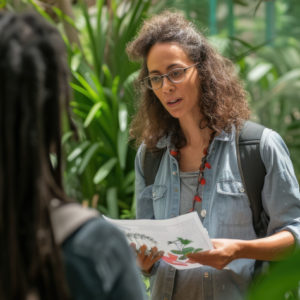Overview
Christians who desire to join God at work in environmental, geopolitical, medical, and scientific theology are called to be active participants in God’s mission to redeem and restore all creation. This mission transcends traditional spiritual boundaries and integrates faith with practical action in various spheres of life. By engaging in these missional tasks, Christians fulfill their calling to be agents of God’s Kingdom on earth, addressing the complex challenges of our world with wisdom, compassion, and integrity. Each action rooted in these theological areas reflects a commitment to God’s overarching plan for creation, inviting believers to partner with Him in the ongoing work of reconciliation and restoration.
1. Participating in Advocacy and Activism
Christians are called to be vocal advocates for justice, standing up for righteousness in all areas of life, including environmental stewardship, medical ethics, and scientific integrity. The call in Proverbs 31:8-9 to “speak up for those who cannot speak for themselves” extends beyond social justice to include advocacy for the voiceless elements of creation, the integrity of medical practices, and the ethical use of scientific advancements. By participating in advocacy and activism, Christians not only champion the principles of God’s Kingdom but also engage in the transformative work of shaping societal values. This involvement is a direct response to the call to be salt and light in a world that desperately needs the guiding light of God’s truth.
2. Engaging in Community Outreach and Healthcare Ministry
Engaging in community outreach and healthcare ministry is a tangible expression of Christ’s love and compassion for humanity. Jesus’ words in Matthew 25:36, “I was sick and you visited me,” serve as a powerful reminder of the importance of caring for the physical needs of others as a reflection of God’s care for all aspects of human life. By providing medical care and support to those in need, Christians fulfill the missional task of bringing healing and wholeness, mirroring the restorative work of Christ. This ministry goes beyond physical healing, embodying the Gospel in action and demonstrating the love of Christ in a broken world.
3. Contributing to Scientific Research and Innovation
Christians engaged in scientific research and innovation are called to approach their work with a deep trust in God’s guidance, as encouraged in Proverbs 3:5-6, “Trust in the Lord with all your heart and lean not on your own understanding.” This trust extends to navigating the complexities of scientific discovery while upholding ethical standards that honor God. By contributing to advancements in science, Christians participate in the exploration of God’s creation, uncovering the intricacies of the world He has made. This engagement not only advances human knowledge but also reflects a missional commitment to understanding and caring for the world as an act of worship and stewardship.
4. Integrating Educational Initiatives with Theological Foundations
Education that integrates environmental, geopolitical, medical, and scientific theology equips individuals with a holistic understanding of their role in God’s mission. Proverbs 22:6, which emphasizes the importance of training a child in the way they should go, underscores the foundational role of education in shaping future leaders who can navigate the complexities of these fields with a Christ-centered worldview. By promoting educational initiatives that incorporate theological insights, Christians contribute to the formation of individuals who are prepared to engage in missional tasks with wisdom, integrity, and a deep sense of purpose. This approach ensures that future generations are equipped to join God in His redemptive work in the world.
5. Collaborating with Experts and Organizations
The principle of collaboration, highlighted in Ecclesiastes 4:9-10, “Two are better than one because they have a good return for their labor,” emphasizes the importance of working together with others to maximize impact. Christians are encouraged to collaborate with experts and organizations in environmental, medical, and scientific fields, recognizing that collective efforts can lead to more effective solutions to complex challenges. This collaborative approach reflects the body of Christ working together, each part bringing its unique gifts and expertise to further God’s mission. By partnering with others, Christians can leverage their resources and knowledge to address global issues more comprehensively and effectively.
6. Nurturing Creation Care Initiatives
The biblical mandate for creation care, as seen in Genesis 2:15 where God commands humanity to “take care of the garden,” calls Christians to actively engage in initiatives that protect and nurture the environment. This involves practical steps such as sustainable living, conservation, and responsible resource management, all of which are essential components of the missional task of stewardship. By participating in creation care, Christians honor God’s creation and contribute to the restoration and preservation of the earth. This work is not just about environmental sustainability but is also a reflection of God’s original design for humanity to live in harmony with creation.
7. Participating in Global Engagement and Peacemaking
In an increasingly interconnected world, Christians are called to be active participants in global engagement and peacemaking efforts. Matthew 5:9, “Blessed are the peacemakers, for they shall be called sons of God,” underscores the importance of pursuing peace and justice on a global scale. Christians are invited to engage in geopolitical issues with a commitment to God’s shalom, working towards reconciliation, justice, and peace in areas of conflict and tension. This global engagement reflects the missional task of embodying God’s Kingdom values in the world, contributing to the flourishing of all people and the advancement of God’s redemptive work.
Conclusion
Christians who seek to join God at work in environmental, geopolitical, medical, and scientific theology are called to be proactive and engaged in these diverse yet interconnected fields. By advocating for justice, participating in healthcare ministry, contributing to scientific research, promoting education, collaborating with experts, engaging in creation care, and pursuing global peacemaking, Christians reflect a holistic approach to the missional task. This integration of faith with action not only honors God’s creation but also furthers His redemptive plan for the world. As Christians step into these roles, they become conduits of God’s grace, wisdom, and love, embodying the Gospel in every sphere of life and contributing to the renewal of all things.

Dr. Curt Watke is a distinguished missiologist whose three-plus-decade-long career has significantly impacted Christian mission work in North America, particularly in under-reached and challenging regions. Holding a Ph.D. in Evangelism and Missions, Dr. Watke has focused on bridging cultural gaps and fostering sustainable Christian communities by developing innovative strategies that address contemporary challenges like globalization, urbanization, and religious pluralism. His emphasis on cultural sensitivity and contextualization in mission work is reflected in his collaborative writings, including notable works such as “Ministry Context Exploration: Understanding North American Cultures” and “Starting Reproducing Congregations.” Beyond his writing, Dr. Watke is a sought-after speaker and educator, lecturing at seminaries and conferences worldwide, and his teachings continue to inspire and equip new generations of missional leaders. His enduring legacy is marked by unwavering dedication to the mission of God and a profound influence on missional thought and practice. Dr. Watke serves as President and Professor of Evangelism & Missiology at Missional University.




